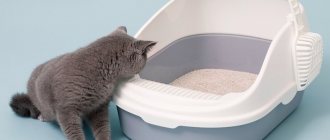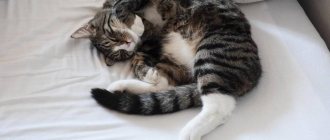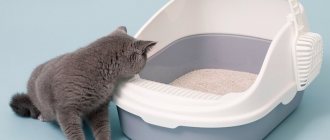Adult animals rarely do things for nothing, unlike kittens and young cats. Cats see and feel differently than humans. A sign that if a cat shits on the bed means that perhaps she wants to say something. Some believe that furry pets can foresee the future and ward off trouble from their owner.
If a cat craps on the bed, it means that perhaps she wants to say something.
A folk sign about why a cat shits on the bed
In general, there can be many reasons for this and everything is not as bad as it might seem at first glance.
Firstly, this may be due to the fact that the cat simply likes to do its business in the owner’s bed; cats are not particularly willing to be trained and, as a rule, take a long time to get used to the litter box. If the pet was adopted quite recently, then bad behavior can be attributed to the fact that it is simply unusual for it to be in an unfamiliar environment; you need to give the animal time.
It is necessary to remember that a young animal needs education, it is necessary to show what is “bad” and what is “good”, otherwise there is a risk of constantly coming across unpleasant gifts from the pet, in the form of torn furniture, overturned things, etc.
Image by Yulia Zyablova from Pixabay
An animal shits on a girl's bed
If a cat pooped on a girl’s bed, it makes sense to turn to the signs of different nations, which interpret this situation differently.
- in China it was believed that a cat relieving itself on the bed of a girl or young woman foreshadows quick luck, an unforeseen pleasant event or profit;
- English omen believes that this is a bad sign - you should expect bad news in the near future;
- European esotericists agree that a cat that shits on its owner’s bed in this way tries to protect her from evil spirits and negative energy influences from the outside.
You shouldn’t punish your pet right away - it’s better to take a closer look at his behavior and try to understand what could go wrong.
What to do if your cat pees on the bed?
If the reason is that you have a conflict with your cat and she is trying to improve relations in this way, the following actions will help.
- Completely eliminate all punishment, screaming, etc., so as not to cause even more negative emotions in the cat.
- Block the cat's access to the bed. Instead, you can offer her, for example, an old T-shirt on which the scent of the right person remains. This way, in a calm environment, a cat will be able to combine its own and human scent without the use of heavy artillery.
- Do everything possible to improve your relationship with the cat: feed it (if someone else did it before), play with it, pet it if it makes contact.
If a cat feels safe next to a “problem” person, there will be no point in peeing on his bed.
Fighting methods
Whatever the reason, something needs to be done about it. Naturally, there is no need to throw away a cat or kitten. How to stop a cat from shitting on the bed?
First of all, you need to take your furbaby to the veterinarian. Start with this, because the disease can get worse while you try other methods of solving problems. In addition, if the pet exhibits “lordly” manners, castration or sterilization may be required.
Use additional trays with different fillings. Equip some of them with grilles. If this method of struggle is not effective, eliminate stress factors.
Pay attention
If the cat began to shit because of the arrival of a new pet, wait until they get used to each other. Temporarily close access to your bedroom
Show love, show attention. Often this is quite enough for the fluffy to become more self-confident and stop mischievousness.
Treat the surface of the bed with a disinfectant. The fluffy creature doesn't like the smell of lavender. Use an appropriate fabric softener when washing bed linen. Apply a few drops of lavender oil to your head.
Or maybe you just forgot to train your kitten to use the litter box. You need to start with this as soon as you get a pet. Then he won’t shit on the bed.
Recommendations
If the kitten was taken from the street, he had no restrictions on the choice of place to defecate. Then he may not understand the prohibition that you can’t pee in bed.
To wean a kitten in a week, read the recommendations:
- Create an unpleasant sensation in the animal at the moment when he is about to pee on the bed. Repel him with aluminum foil placed on the bed. The kitten will step on it, get scared by the rustling sound and run away.
- Play with your pet on the bed, sleep together. In this way, he will develop the understanding that “a bed is not a toilet.”
- Place the kitten's tray in a special place in the house.
- To prevent the kitten from peeing, spank it with a wet rag, spray its face with water from a spray bottle, and then immediately transfer it to the tray. When he finishes his business there, pet him and praise him.
- Cats are repulsed by strong scents. Place a sachet of lavender or any other strong-smelling ingredient in your bed. Avoid experiments with oregano and mint, they attract animals.
- The kitten can see the mother cat in the owner. When they are together, the baby pees on the bedding. In the house it can be replaced with a soft bed.
- The tray should be comfortable, long and spacious enough so that he can unfold it without difficulty.
- If a small kitten has managed to do its job in bed, it still needs to be taken to the tray, but kindness and affection cannot be demonstrated. Express your dissatisfaction with his behavior, leaving him there to “think about your action.”
- Until the animal has firmly learned that it only needs to go to the litter box, forbid it from sleeping in bed with you. The house and bed are suitable as an alternative to a bed. The toilet should be placed next to them.
- The toilet should be made attractive; after cleaning, treat it with a smart spray, then the kitten will be ready to go to the litter box again.
- Cats are clean and will not go to the dirty toilet. A couple of stuck together lumps can scare them away, change the filler or immediately remove the dirty lumps.
- Choose a litter that your kitten will like: clumping, absorbent, wood, silica gel.
- Sometimes the reason is that a particular blanket or blanket is attractive to the kitten, its texture is pleasant for the paws, especially if the tray provided by the owners causes inconvenience.
- Stress may be the cause. It occurs due to moving, a change of environment, owners, or the appearance of other animals in the house. In this case, caress and soothing herbal remedies will help. The doctor will tell you which one to choose.
- If the kitten begins to walk past the bed and pees on chairs, sofas and armchairs, this indicates health problems: cystitis, infection, problems with the urinary tract. At the same time, he will often pee, and sometimes he will not have time to run to the tray. You can understand the reason by contacting your veterinarian.
Preventive measures will not give the expected result if the kitten is sick or worried about changes that are incomprehensible to it. A patient, attentive attitude towards a pet in case of any failure gives better results than physical punishment, screaming and threats. Pets are family members just like the rest of the household. Comfortable living conditions, protection from diseases, a properly selected diet and a convenient, accessible potty will help to avoid problems and conflicts.
Causes of non-pathological nature
Most of the reasons for this behavior of furry pets are purely psychological. In order to identify them, you need to take a close look at the animal’s behavior and try to understand its feelings.
The opinion that exists among many owners of cats that their pets want to annoy people in this way or do it out of spite is wrong. Most often, the reason lies in one of the following factors:
- Inadequate tray contents
. Our smaller brothers love cleanliness, which makes them spend a lot of time putting themselves in order. It is not surprising that the animal does not like the sight of an overfilled tray with wet and unpleasant-smelling litter. Don't get angry when you find a puddle on the bed if the cat's litter box hasn't been cleaned for a long time - this is a natural reaction of the animal, similar to the one that occurs when a person visits a dirty public toilet. - Incorrect location of the cat litter
. Our pets often show particular delicacy in this matter, so the location of the cat in a noisy place, where it is impossible to hide from prying eyes, can prevent a cat from going to the litter box. Also, do not place the tray in close proximity to the feeder.
Changing the filler. A cat can be confused by the appearance of a new sorbent. Because a cat's sense of smell is much more sensitive than we think, he may be confused and put off by an unfamiliar smell in this sensitive area.
Stressful situation
The appearance of puddles in the owners’ bed can be a consequence of a stressful situation: moving to a new apartment or house, the appearance of a strange animal in the house, an encounter with an aggressive dog, careless behavior of someone else’s child, screaming or assault from a person.
Mating season. The hormonal storms occurring in the body at this moment can push the pet to actions that are inappropriate from the owner’s point of view, including the tendency to neglect the cat’s litter box and leave marks on the bed
Such traces smell even more pungent and unpleasant than ordinary urine, since they contain special substances to attract individuals of the opposite sex. This behavior is an algorithm programmed by nature, and therefore is cyclical in nature.
Jealousy. When new pets appear in the house, to which the owners devote a lot of time, the animal often develops an acute feeling of jealousy. Then it tries to remind you of itself in an extremely unpleasant way, leaving puddles on the bed. The same picture happens when a newborn child appears in a family, who takes up all the time of the household.
- Boredom and lack of attention
. A cat or cat can be left at home alone for the whole day, where the animals simply have nothing to do. They can express their indignation in the form of stains on the bed, which will become an unpleasant surprise for people who return home. - Old age
. An older cat may suffer from loss of previous skills, as happens with older people. The situation can be aggravated by minor chronic diseases, which inevitably accumulate in the body over the years.
If a kitten often shits on the bed, this may be caused by the following:
- Lack of the required skill.
At an early age, the baby may not yet be accustomed to hygiene requirements, so it is worth starting to explain to the pet where the tray is located in the apartment and how it should be used. - Forgetfulness.
The kitten may play on the owner’s bed and not feel the urge in advance, so it will shit in the place where it is at the moment. In addition, he may not immediately clearly remember where the tray is located in the apartment. - Fear.
Little kittens are afraid to be left alone for a long time. When their mother is not around and their owners are absent, they can be very scared. In such cases, the bed becomes an island of safety, where you can feel the soothing smell of people. Sometimes the baby is so afraid that he would rather shit directly on the bed than leave this place.
Habit. Many kittens that are in a box or basket with a cat after birth are given a warm diaper at the bottom, where the kittens go to the toilet for the first time. After babies become older, they may mistake a sheet or bedspread for the same diaper and pee right there.
In any case, you should not scold the animal, much less beat the cat, as this can only aggravate the situation.
Main reasons: why a cat pees on the bed
Spraying urine is equated by a cat to a sign saying “Territory Occupied!” On the street, objects along the path during a walk are marked; in an apartment, the owner’s bed becomes the object to be marked.
Reasons why a cat pees on the bed:
Age. The kitten, urinating on the litter near its mother, marks the nest. Considering the owner as a leader-mother, they will pee in the bed. Old animals, with a bunch of diseases, will prefer the owner's bed. This is cooler than a litter box: the warmth helps you relax, and the blanket filling absorbs the contents (which is painful). Sexual activity. During the period of proestrus (pre-estrus state), the cat's behavior changes. She purrs intensely and leaves marks. Cats experience peaks in sexual activity, often associated with day length. They also mark territory, although the animal will soil the bed if it is of high rank. Disease
Perhaps the pet has problems with the genitourinary system; by peeing on the bed, it attracts the owner’s attention to its disease. In this case, contact your veterinarian and do not self-medicate. Stressful situation at home
If a well-mannered, affectionate cat begins to pee in bed, it may be experiencing fear. For example, the owners adopted an adult dog from a kennel who wanted to explore (and strangle) everything that moved. Or relatives arrived with children who would not leave the kitten alone. Moving to a new place. For example, from the city, a closed apartment, to the village, to freedom. A low-ranking individual, having experienced the stress of moving, will be afraid to write in unfamiliar surroundings for a long time: there are only enemies all around. She will endure for a long time, then she will mark herself on the owner’s blanket: the safest place, in her opinion. A high-ranking individual, on the contrary, will try to leave marks after moving, incl. and claws, wherever possible. On a human bed the smell is more intense, the message “I have arrived” will hang in the air for a long time. Dirty tray. What looks clean to a human is not clean to a cat. The cat smells it, the lumps of litter prick its paws. Some animals will loudly meow and demand that the toilet be put in order, others will silently do their job in bed.
Causes
A sudden change in the location of the toilet can be for many reasons, and it does not always indicate a hidden resentment towards the owners.
According to veterinarians and experienced felinologists, the most common reasons for this behavior are:
Poor potty cleaning
Cats are very demanding about the cleanliness of their litter box; the absence of the smell of their own feces is also important for them. This behavior has a genetic predisposition
It is important for feral cats to carefully bury their excrement so that a predator cannot track its presence. That is why, if a cat pees on the bed, you must immediately check the litter box for cleanliness.
Lack of filler or its sudden replacement. Quite often, cats, having discovered a different mixture or even emptiness in the tray, refuse to go into it and choose the owner’s bed as a new toilet.
Health problems. Often, such behavior can indicate the presence of serious health problems. If a cat pees on the bed, it is worth checking its health for the presence of urolithiasis, and if feces are detected, for intestinal diseases. Unpleasant and painful sensations during the processes of defecation and urination may lead to a search for a softer and more comfortable place for the toilet.
Stressful situations. The appearance of a new pet, the birth of a child, a change of environment and many other situations can lead to psycho-emotional overstrain of the animal. Often such changes are accompanied by inappropriate behavior.
Lack of attention and boredom. If the cat begins to “go” to the bed, the reason for this may be boredom and lack of communication. If an animal is alone all day and does not receive proper attention in the evening, this behavior simply serves as a reminder of itself and attracting attention to its person.
Mating season. A surge of hormones changes the animal's behavior. A male cat may begin to shit on a person’s bed, thereby marking its own territory.
Jealousy. If a new pet appears in the house, this leads to a reduction in attention to the existing cat. The animal can quickly find a way out of this situation by organizing a toilet on the owner’s bed, because in this case, the new kitten will most likely be to blame. This kind of revenge is often observed in houses where several animals live.
Old age. Animals in old age can lose their skills, and the presence of chronic diseases is added here.
Behavioral reasons
If you are sure that the problem is not in health or in the litter box, you will have to think and observe. Before behavior correction. You need to identify as accurately as possible the reasons for your pet’s violence.
This is interesting! There is such a sign - if a cat urinates on the bed or owner, this is a sign of money and happiness. No one knows how true this superstition is, but you must admit, a little positivity won’t hurt.
The pressure of a leader cat is important in a house where several cats live, when the alpha cat makes those of lower status nervous. The explanation is true if there are dogs in the house that do not give rest to the purr. The cat pees on the bed because only from this place does it have a good view and is sure that it will not be attacked. Usually the puddle forms on the pillow, since it is calmer for the cat to sit as close to the wall as possible, with its back turned. From a pet's point of view, a bed makes a great litter box! It’s soft, you can bury your tracks, it absorbs moisture well, and for a pinched cat the bed is also a safe outpost.
A cat may make puddles on the bed just because you are away from home for a long time. For example, the owner went on a business trip and all that was left for the pet was the smell of the bed. To solve this glaring problem, the cat pees on the pillow to:
- calm down;
- obtain pseudo-contact with an absent owner by mixing odors;
- attract you home with a strong smell;
- to please you upon your return, showing that you missed you.
A very interesting reason may lie in jealousy, especially if you have been sleeping in bed yourself for a long time and this has changed. The other half not only invaded the house like a hurricane, she/he also occupied one of the most intimate places - the bed! In this case, the cat will pee on the half that is saturated with someone else's smell. Yes, this is true jealousy and a clear sign to the door of a stranger. However, aggression is contained in this gesture only 1-2 times; cats are very adaptive and quickly change anger to mercy. Subsequent puddles in the place of your companion are already a call to exchange smells and be friends... but this is unlikely to be interpreted correctly.
A cat may be attracted to the bedding material, especially if its claws do not cling to it. It’s worth talking about a similar habit if a cat pees on a specific sheet or blanket. If you are convinced that the cat has chosen the bed due to the attractiveness of the material, the tray or filler is not suitable for it.
Many cats stop going to the litter box after changing their place of residence, and this is due to several factors. Firstly, the pet is stressed and afraid of everything new, and secondly, in a new home, the tray is not in its usual place. The bed, as before, smells like the owner, seems very cozy and safe. Similar behavior can be observed after a change of litter box or a new feline family member. As you can see, there are a combination of reasons for comfort, anxiety, jealousy and security.
The meaning of this pet behavior and the signs associated with it
If a cat shits in the bed, this means that he may not like the appearance of previously unfamiliar persons or creatures in the house, for example, a new person, relative or other animal, because of this the cat experiences stress and thus expresses its protest against the new member of the family. There is also a belief that if a cat is targeting a pillow in addition to its sleeping place, this may mean an approaching illness in the person sleeping on this pillow.
Related article: Broken vase: signs
True, this is not the only reason why a cat may shit on the bed, there are several other simple reasons for this, this is what the sign means when a cat shits on the bed:
- If before this the pet regularly went to the litter box, but now leaves behind unpleasant traces around the apartment in a chaotic manner, this may be a sign that it is experiencing health problems. These could be diseased kidneys or a cold in the urinary tract.
- Unexpected diarrhea due to foods eaten.
- The cat experiences stress due to some situations occurring in the family, as mentioned earlier.
- The pet misses its owner and thus shows its concern in the frequent absence of the owner from home.
- The pet's litter box is not kept clean.
Image by EgoAltere from Pixabay
Why does a cat pee in the bed?
To cope with the problem, you need to clearly know the cause of its occurrence, otherwise you will not be able to eradicate the habit completely. So, here are the main physiological factors that provoke a cat to behave like this.
“Marks” the territory. This is one of the most important reasons why a cat may pee in the bed. In this case, it is more difficult with cats that mark their territory constantly throughout their lives. A cat can pee on the bed only during heat to attract a male with her scent.
Pay attention to whether the animal only poops in the bed or whether it happens throughout the house. As a rule, marks are placed in many corners, and the bed is just another marked place
The only way to cope with such a problem is radically - castration or sterilization. Especially in the case of cats, because it is very difficult to constantly fight natural instincts. For cats, you can find a temporary solution - give her special hormonal tablets. They suppress the desire to reproduce and protect the owner from all sorts of consequences - marks and disturbance of the animal. Remember that it is much better to spay or neuter your pet before the onset of estrus in females and before the first heat in males. Remember that after castration, a cat can mark its territory for several more weeks until its hormonal levels calm down. Sometimes the cause of urinary incontinence in a cat may be an incorrect sterilization procedure, but then the cat will pee everywhere, not just on the bed. If this condition does not go away within a few days after surgery, you should definitely see the doctor who performed the procedure.
Cystitis. This is another common reason why a cat starts peeing in its owner's bed. Especially if this happened not to a kitten, but to a fully grown female who had never allowed herself to do this before. With cystitis, urination becomes painful, so the cat, fearing these painful sensations, looks for a more comfortable place to relieve itself. In this case, the owner's soft bed becomes the best option. Checking your pet's health is not difficult - take the animal to a veterinary clinic, where they will take a urine test and perform an ultrasound of the bladder. If the bladder is inflamed, it will be quickly identified. If necessary, the doctor may prescribe additional diagnostic methods. By the way, the reason may be not only cystitis, but also urolithiasis. Taking care of your cat during illness is your responsibility; you should not give up your pet during this difficult period for him.
Problems with the tray. A cat is a very clean animal and will not go to a dirty and smelly toilet. It often happens that a cat pees in the bed only because you haven’t changed its litter box for a long time. The litter should be changed daily, even if you think it is clean. If this is not possible, it is necessary to train the cat to go to the toilet or to special trays with a mesh. Sometimes the filler does not become dirty, but becomes compacted due to long-term storage. In this case, you need to loosen the toilet. Your cat may refuse to go into the litter box if you bought a new litter with an unfamiliar smell, texture or shape. If you only remove “dried” lumps of litter, then do not forget to completely clean the tray once a week, wash it and fill it with a fresh portion of cat litter. This will help you avoid unpleasant surprises in your own bed.
These are the main physiological reasons why a cat is simply forced to go to the wrong place and crap in the bed. But what to do if all possible physiological causes are excluded?
Reviews about unusual cats
If a kitten appears on your doorstep, be sure to take it, there is a high probability that one day it will save you from trouble
“We had a problem in our family - a child became very ill. On the night when the crisis happened (the baby was dying), the house cat Pirate died. I just didn't wake up this morning. The child has recovered and everything is fine now. We got a new cat."
“My husband and I noticed that the cat Manya always lays on her mother-in-law’s stomach. They forced her to go to the doctor. It turned out that the liver was sick. The disease was detected and treated in time. Now everything is fine, and the cat began to lie on my legs. We need to check the joints...”
There are a lot of stories about unusual behavior of cats. It is surprising that almost all mystical stories are associated with animals that themselves came to people voluntarily. Usually these are ordinary “mutts”, without clan or tribe. This happens very rarely with purebred animals, as if they have lost contact with the other world. If a kitten appears on your doorstep, be sure to take it, there is a high probability that it was sent from above, and one day it will save you from trouble.
Why does a cat shit on the bed?
There are adequate reasons for the fact that the pet has suddenly changed the place of the toilet, which have nothing to do with personal revenge or resentment. Cats can shit on the bed because they are overwhelmed by human feelings - lack of attention, sadness, jealousy, high self-esteem. No matter how bad the character of a wayward cat, the explanation for bad behavior should be sought in the psycho-emotional state of the pet or in the state of its health.
Physiological factors
Cats are capable of becoming offended and reacting emotionally to stress, but in extremely rare cases, a pet will defecate on the bed - just for the sake of revenge. They are very clean animals and are careful about their home. Experienced veterinarians identify the following physiological reasons for changing the location of the toilet:
- Disease of the genitourinary system or intestines. Simple indigestion can cause bad behavior. It is recommended to take your pet to a veterinarian to ensure that no disease is causing the problem.
- Psycho-emotional surge. The expression of feelings is provoked by environmental factors. The appearance of strangers, children or animals in the house, a change of environment or any other stress can lead to rash actions by the cat.
- Uncomfortable tray. You need to check the filler, which must be clean and dry. It is recommended to clean the tray daily. The cat may refuse to go to the tray in which the filler has been changed to another. The tray should be large and deep so that the cat can turn around in it and bury feces.
- Hormonal imbalance during the mating season. An uncastrated cat leaves a mark on its territory in the form of odorous urine.
- Old age takes its toll on cats too. He may not have time to reach the tray or forget where it is.
Behavioral
If the reason is not physiological factors, then you need to deal with behavioral ones:
- Pressure from other pets is relevant if several cats or a cat and a dog live in the house. The alpha animal will always suppress the rest when it comes to cats. Dogs and felines often do not get along, so the cat is looking for a safe place to relieve itself.
- Long absence of the owner from the house. A pet may crap on the bed simply because it misses its owner so much.
- Jealousy. This is relevant if the owner slept alone with the cat for a long time, and then this suddenly changed.
- Bedding can be attractive to your pet if its claws don't catch on it. In this case, the reason is relevant if the cat pees on a certain sheet or blanket.
- Change of residence, relocation. Firstly, it is stressful for the animal, and secondly, the tray is in an unusual place. Veterinarians offer sedatives for cats.
The group of animals that mess up most often
Several groups of animals are potentially susceptible to behavioral changes:
Kittens. When a small pet is not yet toilet trained, he himself seeks to satisfy his needs in a place convenient for him. The baby prefers a soft surface, so most often bowel movements appear in the owner’s bed. In this case, you need to show maximum attention to the animal and teach it to go to the toilet. Moreover, you should not shout at babies or poke their faces into feces, as owners often do. With such actions, the kitten gets even more stressed, he does not understand where he can go to the toilet, and continues to shit in the wrong place.
Unsterilized cats, female cats. During sexual activity, physiological and psychological transformations occur in the body of animals against the background of hormonal fluctuations. The behavior of pets becomes inappropriate, you can expect any dirty trick from them
With urine, females and males try to attract the attention of the opposite sex, so they leave marks throughout the apartment. The situation is aggravated by physiological urinary incontinence and frequent urge.
Pregnant cats
The animal begins to shit on the bed due to hormonal changes. Particular activity occurs immediately before giving birth, when the animal selects a suitable place and marks the territory. Sometimes feces are left on the bed along with urine.
Elderly, sick animals. In the presence of chronic diseases, as well as due to old age, the animal simply does not have time to get to the toilet, does not remember its location, etc.
To quickly solve the problem and make your life easier, your pet needs to choose the right model of behavior. It is necessary to treat with understanding, evaluate the objective factors of actions, and take appropriate measures.
What measures to take
In order to understand how to correct the animal’s behavior, it is necessary to establish the reason why it began to use the entire house as a toilet. Once this reason has been established, it is not necessary to punish the cat who has pooped - sometimes you can return it to the litter box using gentler methods.
What to do for skeptics
All people, regardless of whether they believe in omens or not, need to remember that it is necessary to accustom a kitten to the litter box from the first days of life. However, teaching your four-legged pet to relieve itself in a specific place in the house is still half the battle. Next, you need to make sure that the litter in the cat litter is always fresh and the tray itself is clean, otherwise the cat may start looking for another litter box.
If everything is in order with the tray and your four-legged friend has long been accustomed to it, but suddenly begins to mark the master’s bed or other objects in the home, then the following will help wean him from bad actions:
- If the animal is sick (diarrhea or disease of the genitourinary system), then it must be shown to a veterinarian, who will prescribe treatment for the cat. As a rule, a recovered pet returns to the tray on its own.
- If a cat is offended by a person and takes revenge on him for something, then the owner would do well to try to understand why this happened. Perhaps the cat felt that the owner’s love for her had decreased due to a new family member (child) or another animal appearing in the house. In this case, the owner of a four-legged pet should show more attention to it for some time. It’s not worth punishing a cat for a shitty shoe or bedspread. It will be enough to defiantly ignore him after each such incident. And, conversely, after any proper trip to the litter box, pet the cat and give him his favorite treat.
- If a purr craps all over the house because he is already old and simply does not have time to get to the litter box, and the owner loves him so much that he does not want to put him to sleep, then the solution may be to install another cat litter box in another place. It is easy to accustom an old cat to such a toilet by placing any object that carries the smell of her urine in the spare tray.
- The worst option is when a young male cat urinates on the furniture and belongings of the owners, marking its territory. In this case, it is sometimes impossible to return it to the tray using normal methods, even if you treat all marked places and objects in the house with chemicals that repel strong odors. The only method to wean an animal from improper actions is castration.
What should superstitious people do?
For those who believe that cats connect the human world with the subtle other world, esotericists give some advice on how to wean your four-legged pet from walking past the litter box:
- If a cat shits on the bed of an owner who is already sick or prone to illness, then the person should try to clean his house to avoid the illness or death predicted by the furry soothsayer. Daily reading of prayers, blessing the house with lit church candles, fumigation with incense, and also wearing a special amulet will help cleanse your home.
- Those who are sure that a kitten pooping on the bed predicts a quick financial profit can be advised to strengthen the effect of the prediction by additionally charging the home with material well-being with magical rituals and talismans.
- Cats anticipate future quarrels between family members, especially between spouses, so it would be a good idea for the owners of the crapping animal to analyze their own behavior and try not to lead to family conflicts. Then the cat will not mark the marital bed.
- If a cat constantly shits on the same thing, then perhaps the owner of a four-legged pet should listen to the furry “esotericist” and throw this thing out of the house, since it poses a threat to all family members with strong negative energy.
Every person, when getting a kitten, wants to receive only positive emotions from their pet. But sometimes there are embarrassments with the latter. However, instead of scolding a naughty pet or trying to correct its behavior in the usual ways, sometimes it can be useful to “listen” to what the four-legged soothsayer is trying to say and check your own health or the things he has soiled. It is possible that this will help the cat owner not only avoid some kind of disease, but also protect himself from something more terrible.
What should superstitious people do?
If a person believes in omens, then he can clean the house using any available means: fumigate with incense, walk around with church candles, read a spell or make a talisman.
It is also necessary to take into account the positive interpretation of superstition - about monetary profit. If it comes true, you can charge the house for further financial success with rituals or talismans.
You need to take a closer look at your pet's behavior. If he constantly stains a certain item or furniture (and only that), it carries a negative charge and should be thrown away.











